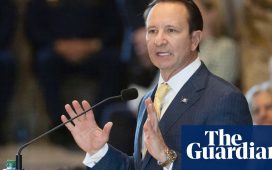Despite Joe Biden’s promise to reverse his predecessor’s immigration policies, Ijeoma “Golden” Kouadio is increasingly fearful Biden won’t rescue her family’s suspended American dream.
In 2019, Kouadio’s family won the diversity visa lottery, which is meant to increase the diversity of immigrants to the US. But just before their visa interviews, Donald Trump implemented an immigration ban that runs through 31 March. If the president doesn’t step in, Kouadio’s family will lose their visas.
“I don’t even know how to feel,” Kouadio told the Guardian from her home in Ivory Coast. “I’ve stopped working because I thought I was moving in January.”
Biden has taken a slew of actions to roll back or review Trump’s anti-immigrant policies, but activists say Biden must do more to prove his commitment to meaningful change.
Anxiety is building around certain policies, such as proclamations 10014 and 10052, the ban on immigrant and non-immigrant visa holders which is keeping Kouadio and her family out of the US.
Attorney Jesse Bless, who is involved with litigation against the bans, estimated it would take about 10 minutes for Biden to revoke them. “If President Biden lets these visa bans go until they sunset on March 31, he will have effectively terminated the opportunity for diversity visa holders forever,” Bless said.

Bless, director of federal litigation at the American Immigration Lawyers Association (Aila), is also involved with litigation on the Trump-era healthcare insurance proclamation, which requires immigrants to prove they will have health insurance within 30 days of entering the US, or have financial resources to pay for any foreseeable costs.
It’s similar to the public charge rule, which sought to penalize immigrants who used public benefits, and which Biden’s team said they oppose.
Bless said that though the Biden White House revoked the travel ban, which blocked people from mostly Muslim-majority countries, by leaving these proclamations in place, people are not seeing the benefits of the rescinded travel ban.
“The executive actions signed thus far are just the beginning,” a White House spokesperson said. “President Biden has been very clear about restoring compassion and order to our immigration system, and correcting the divisive, inhumane and immoral policies of the past four years, which is our focus in the coming weeks and months.”
A complication for Biden has been getting the agencies which act on immigration policy, primarily Immigration and Customs Enforcement (Ice), to comply.
A court blocked Biden’s 100-day moratorium on deportations and Ice has attempted to resume deportation flights which defy guidelines introduced by the new Department of Homeland Security (DHS).
Ice also attempted to violate the guidelines by deporting asylum-seeking families being held in Texas, but it was stopped after a coalition of 110 advocacy groups, including Amnesty International USA, stepped in.
A researcher for refugee and migrant rights at Amnesty, Denise Bell, said that the confirmation last week of Alejandro Mayorkas as DHS secretary would hopefully improve adherence to the guidelines, known as the Pekoske memo, and change the agency’s culture.
“Immigration enforcement authorities have become more emboldened to detain and deport people and that correlates with rhetoric and an agenda that was very based in anti-immigrant, anti-asylum, anti-refugee sentiment that dehumanized people,” Bell said.
Though Bell said much more change is needed, including a drastic reduction in immigration detention, she was encouraged by what has happened so far, including the refugee protection order issued last week.
“Those are there because of advocates, because of the public, saying we need to do differently, we need to do better, we need to roll back what happened in the past four years,” Bell said.
An early test for Biden will be his response to the expected increase of unaccompanied children at the border. Advocates are monitoring two facilities being opened to prepare for the projected increase.
Attorneys are also waiting for the administration to take a position in a lawsuit which accuses the government of denying due process to children, some as young as four, who cross the border on their own.
These children came to the border with their families, but were turned back by Trump’s Remain in Mexico policy, which forces asylum seekers to wait in northern Mexico before their case is processed instead of waiting in the US, as was policy in the past.
“Many of these kids have ended up crossing on their own, sometimes their parents send them, because they fear they can’t keep their children safe on the Mexico side of the border,” said Esther Sung, an attorney on the case. “I have heard some older kids choose to leave themselves.”
Unaccompanied children are supposed to be excluded from the program, officially known as migration protection protocols (MPP), but it is being enforced against them, said Sung, a senior counsel at the Justice Action Center. “What we have with these MPP kids is still family separation,” she said.
They are hoping Biden’s administration will moot the case or settle it, but while they wait, the influence of the Trump administration hovers over the children.

Maleny Delgado, who was raised in the US undocumented, said she was pleased Biden had prioritized immigration reform but she would not happy until there was a pathway to citizenship and a halt on deportations.
Delgado, a member of the immigrants right group Casa, knows not only the stress of being undocumented, but is also scarred from watching her mother be deported in the beginning of 2015.
Ice agents came to her Pennsylvania home one night and attempted to take everyone inside into custody, including Delgado, by then a citizen, and her sleeping six-year-old daughter. Her nine-year-old son still struggles with separation anxiety disorder and is always by Delgado’s side, fearful she will be disappeared like his grandmother.
With a new president in office, Delgado is determined to fight to make sure no other family has to go through what hers did. Delgado said: “It’s not something I am going to be able to erase or the government is going to be able to erase, but I want my story not to happen to anybody else.”







